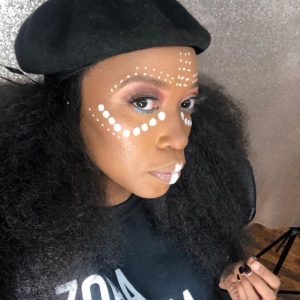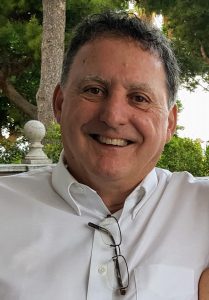UP
I move into Metropolitan Towers during the heat and hollow of an empty summer, when all of New York City is racked by disease, and the sidewalks stink of anxiety. Dima and I broke up in June, and I can’t afford our old Harlem apartment by myself. I can afford the Towers, which consist of two 1960s Brutalist brown squares with a few cement balconies that cantilever drunkenly off the sides of the building. Windows have been replaced over the years, and now the glass is mismatched: some panes shine blue in the sunlight, others reflect a cheap shade of turquoise, still others have been buffered by city grit into a scratched ugly beige. The building was originally designed for single men to commute to Wall Street. Every apartment is a studio.
My building has four elevators, one of which has been outfitted with black curtains to accommodate my move-in. My sister and her husband, Dan, stuff the elevator full of IKEA bedposts, my broken desk, a bedside table, and boxes of books.
“Is this everything?” Dan asks, panting.
“All the furniture, at least. I have more clothes and kitchen stuff.”
“You’ll need a couch.”
“Maybe.” I don’t want to give Dan any credit. He’s the reason my sister moved to Philadelphia.
The three of us crowd into the elevator. Dan smells like sweat and self-satisfaction. As the elevator ferries us skywards, I watch the red numbers shapeshift beneath the glowing word UP. My fresh start is at the top of this building. My new beginning.
The mirrored ceiling reflects my upturned face: short mousy hair; eyes like two scared fish. I’ve never lived alone before.
DOWN
I’ve ridden the elevator a dozen times this week and have determined that there are two attractive men in my building. One has a golden retriever. The other goes for regular morning jogs.
20C
In the weeks following my move-in, before teaching starts up again, loneliness germinates in my apartment. It grows mostly at night, festering in the dark, thriving on dampness. By sunrise it has shot up spores. The spores are small but strangely flesh-colored.
DOWN
Complaining is the one conversation topic that requires no preamble. Forced together in the elevators of Metropolitan Towers, my fellow residents and I skip the greetings and commence griping. Grievances vary: closet shelves (collapsing), door hinges (over-painted), electrical sockets (broken), light switches (flickering), smells (gross). One person tells me the elevators are shrinking, but no one has confirmed that yet.
I’ve learned to write down my complaints on yellow sticky notes – describing the broken thing in as much detail as possible – otherwise, Jeremy at the front desk tends to get the work order wrong. I think he just makes them up. Twice now I’ve complained about a sparkless burner, only to find a workman banging on my door trying to fix my faucet. Whenever I mention these errors to Jeremy, he blames them on flukes in the “system,” which — as far as I can tell —is an open Word document.
Fixing broken things used to be Dima’s responsibility. He believed home maintenance was a matter of personal integrity. He insisted on repairing everything himself. Consequently, half the pipes in our old apartment were duct taped beyond recognition. Now the dysfunctions of my current studio feel punitive as if Dima left them for me on purpose.
DOWN
One morning, I wait for the elevator — armed with a yellow sticky, dusting loneliness spores off my shoulders like dandruff — when a shriveled, old white woman rattles towards me with a pushcart full of newspapers, bananas, and pill bottles. She starts complaining immediately: “Did you notice the A/C is out again? I’ve had to sleep every night in my underpants with the fans blasting. And that construction noise — ugh! What city crook gave ‘em a permit to start at 7 am? You sleep much?”
“No.”
“Because it’s too noisy! You know it didn’t used to be this way. I’ve lived here all my life. Used to be a much quieter town. It’s these developers. They’ll build on every square inch. Don’t give a rat’s ass about the architecture or the people or anything. You new? Never seen you before.”
“I just moved in last month.”
“Welcome. Don’t go to the Sprove market or whatever the hell it’s called across the street, some copyright nonsense. I think it used to say Grove, but they had to change it to Sprove – anyways, don’t go there. Hoof it over to Shoprite by the mall. It’s the same stuff but cheaper.”
The elevator arrives, and we trundle on. The woman is so small that her rolling cart reaches up to her chest. Her collared Hawaiian shirt is tiny enough for a child. The armholes gape around her bony, waggling arms, yet her voice seems to take up more space in the elevator than my whole body.
“What you got there?” she asks, pointing a minuscule finger at my sticky note. I
show her: storm windows (leaking).
“Use a towel to soak it up. Or collect it and water your plants. That’s what I do. Saves resources. What’s your name?”
“Everyone calls me Snaggle.”
“Snaggle? What kinda name is that?”
I tug down my mask and show her my crooked front incisor.
“Aw yeah, I see. You like it when people call you that?”
I shrug. It had never occurred to me to protest the nickname. I let people call me what they want.
“Anyways, I’m Doris,” she says. “I’m bringing the newspapers to my friend Elayne on seven. She don’t get out much.”
The New York Post and Daily News stare up at me, covers soaked in headlines:
Paranormal Rise as Residents Spend More QT at Home
Well Woman Learns Dark Secret
Area Man Manifests Millions: ‘Cash just showed up on my porch in a paper bag’
“Does this elevator seem smaller than normal? Or did I mix up my pills again?” Doris laughs with a smoker’s rattle.
“I think it really is shrinking,” I say.
Then Doris issues a mantra of Big City Zen: “Ehn, screw it. I’ll adapt.”
The doors open, and she waves a skeletal hand. “See ya later, honey.”
Doris is my hero.
20C
The loneliness spores have mutated. They’ve grown eyestalks with stick-brown irises—the color of Dima’s and the stalks glow in the dark. I can’t sleep for all the glowing. Whenever I wake at night, I find the eyebulbs gazing at me lovingly? Accusingly? Blinking their white lids. I wonder if I manifested the stalks, like the man from Doris’s newspaper.
In the morning, I scrape them off the walls and throw them in the garbage.
UP
Mercifully, the semester starts. I’m happier when I’m busy, clacking away at my laptop in the corner. Days and weeks glide by, frictionless. Pieces of my sanity start to slide off the never-ending screens. Zoom workshops and retraining programs keep trying to fix something that isn’t working, like adding more lubricant to what is fundamentally disappointing sex.
Today the sky is blue. I flee the confines of my apartment and walk the neighborhood, seeking texture. The breeze blows autumnal scents of ripening leaves, car exhaust, the smell of uneaten fruit inside children’s lunchboxes. The day is so open and bright that I don’t want to return to my apartment. The elevator doors unfold like the arms of a warden.
DOWN
My northern neighbor, a middle-aged Indian divorcée, joins me at our floor’s elevator bank with her daughter, who looks to be about eight or nine years old. The girl wears pink leggings on her thin, stork-like legs and a sequined top that matches her facemask. She flutters down the hall, giving her light-up sneakers a peppy hop-skip. It reminds me of when I used to work in elementary schools, back when teaching meant the joy and germ of human contact: kids sneezing on my sweater, grubby hands grabbing after recess, bodies crashing into my legs in eagerness to get to the carpet for storytime.
“Did you hear that the elevators are shrinking?” my neighbor asks as we sidle into the car. “Carlos at the front desk told me. Apparently, they measured: shrunk at least ten inches since July.”
“Is Carlos the nice one?”
“Yeah, he’s a good guy. Usually hands out pencils on the first day of school.” She smiles at her daughter. “Of course, this year is different.”
I ask the girl what she’s learning in her online classes so far. She says multiplication. I throw her a soft ball: “What’s two times 2?” The girl hesitates, twisting her fingers around as if trying to wring the answer from her skin.
“What’s two times two?” her mother repeats, shaking her shoulder. “Don’t you know?”
The girl’s wide eyes dart from her mother to me, and ocular sprint back and forth.
“It’s ok. I was never very good at math either,” I say, hoping to relieve the pressure. The girl squeaks. Maybe the shrinking elevators are a manifestation of my dwindling social awareness.
20C
My lonelinesses crawl out of the primordial ooze. They add appendages. I can no longer scrape away the legless spores. Instead, I have to run around my apartment with a broom, trying to sweep up the many-limbed creatures that cartwheel across my floor, making a game of evading me.
At least their eyes look less like Dima’s. Now the eyestalks develop the slit yellow pupils of a hunter.
DOWN
Hot Jogging Man gets on at the twelfth floor. He is Korean and tall, with jet-black hair and thick eyebrows. He has forgotten to wear a mask, and when he sees mine, he makes the appropriate gestures of guilt and shame. He covers his mouth with one hand while cueing up a playlist on his phone. I watch him scroll, triceps sliding beneath the skin of his upper arms, wide thumbs teasing the screen.
I wonder if he has the same happy trail as Dima, the same slightly concaved chest. I bet he has abs; I bet he’s hardened and hairless under that hoodie. I imagine licking Jogging Man’s stomach, squeezing his arms. I want to floss my teeth with his sweatband, bury my nose between his butt cheeks, scratch track marks into the wide wings of his back.
Jogging Man shoots me a startled look. I jerk my eyes down and away, heart pounding. Can he hear my thoughts?
DOWN
Welp, the Hinge date was a huge mistake. In the morning, I walk him to the elevator. “It’s cozy in here, isn’t it?” he says, stepping into the wood-paneled car. I tell him to go down alone. I don’t want him to try to hold my hand.
Back in my apartment, I write a new sticky note for the front desk: elevator shrinking (along with my prospects and expectations).
20C
The many-limbed eyestalks multiply quickly until, at last, I am overrun by lonelinesses. I give up trying to exterminate them. Instead, I simply flick them off my bed in the morning, toe them away from the toilet, tweeze them from the leaves of potted plants, their tiny suckers flailing. I can barely get dressed for all the tentacled creatures hanging off my shirtsleeves.
My one rule is that the lonelinesses cannot leave the apartment. “Please,” I beg, cracking my front door. “Stay back!” Sometimes I throw them a crust of stale bread dipped in saltwater, just to distract the horde long enough for me to flee. The lonelinesses love anything that tastes like tears.
I shouldn’t feed them, yet I feel guilty they even exist. I’m pretty sure it’s my fault.
UP
Metropolitan Towers finally hires a repair company to examine the shrinking elevators. One car remains operational while the repairmen evaluate the problem. Lines form. Everyone looks annoyed. Jeremy goosesteps up and down the lobby with a tape measure, enforcing six feet apart. We wait for twenty minutes.
Eventually, I pile into the elevator with a bald Puerto Rican guy I’ve never seen before. As soon as the doors close, he starts grumbling.
“It’s these Indian families. There are too many of them! They have too many children, and now we wait for everything.”
“Um, I think it’s the elevators that are the problem. Four cars should be enough if they weren’t shrinking.”
But the man doesn’t want to hear my structural explanations. He wants someone to blame, or even better, a monolithic group of someones. He says that this building was meant for single people, and now all of these Indian families have moved in. “I’ve lived here for twenty years, and I’ve never had to wait so long for the elevator. It’s ridiculous.”
I open my mouth to contradict him, but before I can say anything, the man exits on the fourth floor.
DOWN
There is a lone dog in the elevator today, a Schnauzer, who stares up at me with wet eyes. Someone has lost their dog.
20C
Every morning I wake up panicked, heavy under a blanket of lonelinesses, their suckered tentacles all over my sheets and face. Then as the day wears on, the sheer magnitude of the problem lulls me into ambivalence. I get used to brushing lonelinesses off the couch. It becomes second nature to scan each forkful before eating (I suspect the lonelinesses are poisonous; their skins are slimy like tropical frogs). At night I collapse under the covers, relieved the battle is over.
But I don’t sleep well. The lonelinesses make these annoying little absences of sound, and the collective roar of their silence is deafening.
UP
Today I read Tolstoy in the park, an old copy of War and Peace that was Dima’s from college. The story is operatic: Napoleon marches towards Russia. Disaster looms. Natasha longs for love. The 1812 comet bursts across the night sky. I thought I might get bored, but I don’t. Political events keep redirecting the narrative arc of the characters’ lives, or maybe the characters’ lives keep redirecting the narrative arc of political events. At any rate, I flip a page, and death hangs over the wounded Prince Andrew Bolkonski just as it hangs over all of Russia. Look, Tolstoy whispers, see how divinely permeable we all are? Even a distant tragedy can fracture the fragile talisman of a person’s life.
Dima has written something next to a description of Natasha weeping: so confused. I become enraged. How dare he judge Natasha for going through her process? Pierre is constantly confused, but Dima never makes a note about him. Would I have stayed with this man if there hadn’t been a pandemic? Would Natasha have married Prince Andrew? I leave the park feeling porous and exposed.
It’s the first truly cold day of winter. My nasal passages freeze when I’m outside, but back in the Towers, they thaw and begin to run. I need to wipe my nostrils, but a Chinese couple gets into the elevator with me, and I don’t want to make them uncomfortable by lifting my mask. So, I let the snot run down my chin, feeling brave.
UP
Here are the elevator demographics of Metropolitan Towers:
- Indian families have children and bicycles but no pets.
- Young white couples have pets but no bicycles.
- Old white singles have Slavic or Puerto Rican accents and reek of cigarette smoke.
- Chinese couples do not have children or bicycles or pets, and they do not smoke.
- Rutgers students smoke pot.
DOWN
Two thirty-something women wait at the elevator bank on my floor. They hold hands. They look friendly and in love. One woman sports a shade of carmine lipstick that I would normally compliment, but today I am in a dismal mood.
My best friend Inez, who recently broke up with her boyfriend, called me this morning to say that I was not supportive enough when she was with her boyfriend. She said I’d seemed overeager for them to break up. She’d concluded that I was jealous of her, and although she’d already forgiven me for my jealousy, she needed to hear me apologize for it.
I did.
“But don’t worry, I can help you work on your jealousy,” she said. “We can do this together.” I hung up and sobbed. I resented Inez for misunderstanding me. I resented myself for caving so easily.
“Do you mind facing away from us in the elevator?” the carmine lipstick woman asks. “It’s nothing personal. It’s just that we’re really getting worried about the shrinking cars.”
“I can’t believe they haven’t fixed them yet,” the un-lipsticked woman says. “Worst time to have shrinking elevators, during a pandemic. Frickin’ nightmare.”
I think of all the ways I’ve manifested my own worst nightmares: “Maybe they’re shrinking because of the pandemic,” I say.
The two women exchange a puzzled glance.
“How so?” Carmine asks.
“Never mind,” I say.
The elevator arrives, and the three of us ride down in silence. I stand at an angle in the corner, staring at the peeling wood panels. I want to smooth things over with the couple, but I can’t seem to claw my way out of my hoodie. I think the hoodie has become sentient and is slowly digesting me. I’m being pumped deeper and deeper through the bowels of my own sweatshirt. I’ve noticed this about my life lately: the lonelier I get, the more I feel affected by the objects of the world as if they were absorbing my life force.
When we reach the lobby, the two women hurry away. I try to comfort myself: maybe I’ll get another chance to make a better impression.
But I doubt it.
DOWN
It’s an unseasonably warm day in early December, and I’ve been laid off from my job at Rutgers. They usually give me a full schedule in the spring, but the financial emergency has forced them to tighten their belts. My position is cut, along with 399 other adjunct professors across all Rutgers campuses.
My sister calls me as I drag myself to the elevator to suck down a few breaths of fresh air. She asks if there’s anything I need. I hesitate as the list of things I actually need sieves through the filter of what I can reasonably ask someone to give me: self-confidence, tenderness, a hug, reassurance that everything —absolutely everything—is going to be ok.
“Are you in the elevator?” Dan chimes from the speakerphone.
“No, Dan. I’m dying. That beeping is my heart monitor in the ICU.”
“Sheez. I was just asking.”
It feels good to hate Dan.
20C
I go to war with my lonelinesses, or more precisely, my lonelinesses go to war with me. They draw borders around the corners of my studio. They split into a complex network of tribes, the inner politics of which are too complicated for me to understand. I am their only common enemy. As soon as I open my front door, they shoot at me from behind barricades of dirty laundry, their tentacles unleashing an onslaught of crumpled yellow sticky notes, onto which they’ve scrawled work orders:
Friendships (fractured)
Career (missing)
Self-pity (leaking)
I return fire, kicking away their sweatpant trenches with one easy swipe. The lonelinesses retreat to plan their next attack.
But as soon as the troops are scattered, I go about my normal business. The truth is: I don’t really want to hurt the lonelinesses. They’re my only company.
DOWN
I’ve read too many news articles today. I quickly decide that:
1) I must escape this apartment.
2) I must call Dima.
I dial in the elevator, but Dima’s voicemail answers, and I hang up. Why don’t elevators have windows? Why are these cars so small? Who designed these things to look like hurtling yo-yo coffins? I’m hyperventilating. The elevator walls squeeze tight as a trachea. I swear I can see them move. Pretty soon, I’ll be stuck in here and I’ll never get out.
A bell dings.
Hot Jogging Man hops on. He recognizes me and gestures to his mask, dark eyes smiling. “Oh, hey! I got my mask now. I remember last time that kinda freaked you out.”
The notion hits me that life has been continuing on outside my head, but it seems too good to be true. Suddenly all I want to do is put Hot Jogging Man at ease. I want to be generous to all mankind as I wish that all mankind would be generous with me (and as I secretly fear that they won’t be). This gentle soul has remembered me!
“No, it’s fine!” I say. “I’m sorry if I had a weird reaction.”
We chuckle, mutually reassuring one another until we reach the first floor. Jogging Man gives me an uncomplicated wave goodbye. I stand in the lobby in disbelief, staring at the landscape paintings, the rubber doormats, the chair with its stack of uncollected newspapers. Everything looks well-lit, tired, but orderly. No one knows that I have been panicking. Some people haven’t even picked up the news today.
UP
Days sneak past me like teenagers slinking out past curfew. I feel like a divorcée smoking long cigarettes in the living room while my days tiptoe out the back door. Each day thinks it’s being very clever, giggling as it clicks the latch and runs off, escaping over the shadowy lawn. They think that I don’t notice their passing, but I do. I covet the parties they must be attending, the clandestine meetings with other young axis-spinners. At the same time, I feel apart from them, in an era of no-days, smoke rising from my tattered silk nightgown, the living room darkening around me.
I’m a little drunk. No one has contacted me in some indeterminate length of time. The emptiness seems to stretch on forever. Finally, I call Inez. She says that she wants space from our friendship. She needs some time to herself.
We hang up, and I pour a glass of whiskey and pace my apartment. I didn’t even get to tell Inez about the shrinking elevators. She would have instantly known what they meant. I wonder if my best friend’s rejection portends my own unlikability. I drink more.
Usually, when my phone is silent, I drag myself to the elevators and go somewhere, talk to anyone. When the elevators are empty, I pick up my phone, talk to someone, say anything. Today, I do both. I press the elevator button and dial my sister.
“Hey! How you doing?” she answers, and in an instant, everything comes tumbling out. I monologue about my lonelinesses, about my job, about my sneaky ungrateful days, about the nightgown and the smoke and Inez, who won’t speak to me, and how wretched that feels.
“That sounds really difficult,” my sister sympathizes.
Dan adds: “Well, you’re an extrovert, Snaggle, living alone for the first time, going through a break-up, plus job insecurity. This is a rough time for you.”
“Duh, Dan,” I say. I regret the words as soon as they leave my mouth.
“You’ve got to stop talking to him like that,” my sister whispers angrily. “It hurts his feelings.”
20C
My resolve builds in the elevator. By the time I open my apartment door I am armed in a suit of rage. I snatch a frying pan from above the oven and start swinging. I smash eyebulbs and tentacles and suckers and silences. I smash them all. In the end, I am sweating. My apartment is coated in guts. The counters are smeared with toxic rainbow goop.
Loneliness massacre.
DOWN
I’ve been rehired at Rutgers, but only for one class. They apologize, but that’s all they have available for the spring. Enrollment is down 30% after the first semester of remote learning. I spend two days calculating groceries, internet bills, credit cards, student loan payments, then decide to sell the couch that Dan guilted me into buying. When the Craigslister knocks, I help him haul the sofa to the elevators, but it barely fits.
“There was plenty of room when I bought this thing six months ago,” I apologize, as we stuff in an armrest.
DOWN
A woman named Charlotte is in the elevator today. She says that the residents have drafted a petition demanding that the elevators be replaced, or else we will implement a rent strike. I want to drink the conviction pouring out of her eyes. I want to rub her life force into my skin.
“Will you sign?” she asks, handing me the clipboard. We’re so tight in the tiny car that she prods the petition painfully into my chest. From this close I can see that Charlotte wings her eyeliner like Inez, that she has clear plastic glasses like my sister. She offers me her back as a writing surface.
“Thanks,” she says. “I’ll send out email updates to let everyone know how management responds.” When I return the clipboard our fingers touch, I linger on her hand, exert just the slightest bit of pressure, feel the warm blood circulating beneath her skin. Panic flashes across her face, and I pull away.
“Thank you for organizing this,” I say, like the non-threatening non-pervert that I am.
“Mmhmm,” Charlotte murmurs.
I hold my own hand the rest of the way down.
20C
For a few days—with the lonelinesses gone—I finally get some sleep.
UP
I’ve found another hero.
The first time I saw her was at a distance, as she was walking away down the sidewalk. She was wearing just as fabulous an outfit then as she is now, all flashy bright colors and shoulder pads and neon lipstick and a hat as if she has not changed her wardrobe since Sunday morning circa 1985, and she doesn’t give a damn who knows it. This is what amazes me about really old ladies: their I-don’t-give-a-fuck-ness.
In the elevator, I compliment the woman’s outfit, and she pivots to a philosophical musing on color: “Red never fails to delight.”
“Red’s my favorite color too!”
“I always thought the desk clerks should wear some color instead of those drab white and black uniforms.”
“Like maybe a scarf or a beret, an accent piece,” I say.
“An accent piece, exactly!” she smiles. “Maybe a brooch?”
“Or some big earrings. And a feathered headband!”
The woman throws back her head and laughs, placing a hand on my arm as if we were guests at the Met Gala and I was some clever New York hedge funder instead of an unwashed teacher with a grocery cart full of ramen.
“What’s your name, dear?”
“Everyone calls me Snaggle.”
“That’s an odd name.”
“Well,” I hesitate. Yet with the lonelinesses gone, I am filled with a desire to be known, “Actually, my name is Ruth.”
“Ruth! That’s lovely! Why didn’t you say that in the first place?”
“I guess I always thought it was an old lady name. No offense.”
“Darling, no offense taken.” The woman leans forward conspiratorially, her black hair peeking out from her hat. “Old ladies are the freest people on earth.” The elevator dings on seven.
“Hope to see you around, Ruthie darling, although I can’t say I get out much.” That’s when I realize: this is Doris’s friend, the one who reads trashy newspapers and eats plenty of potassium. She sashays down the hall, looking regal, trailing Chanel.
DOWN
The attractive man with the golden retriever enters on floor eighteen, and I frantically glance down to check what I’m wearing. These days the word “outfit” has lost all meaning. Clothing equals skin covering. Most days, I would gladly wear a beige Communist jumpsuit with a unisex crotch flap just to simplify things.
On this particular morning, I have apparently decided to don a pair of psychedelic bike shorts and a t-shirt from the Women’s March that says, “Paws Off My Pussy.” The bike shorts are too small. My thighs make swollen collagen rings around the base of the leg holes. My leg hairs stick out at all angles. Plus, I’m wearing a winter hat with earflaps. The laundry room is always freezing but putting on a coat requires hangers and buttons and zippers, and back in my apartment. I’d convinced myself that heat escapes exclusively through the head, so it seemed reasonable to pull on a cap and leave my house looking like a lazy feminist logger.
At least I curled my hair this morning. I curled it for a Zoom call with my colleagues, but then the meeting was canceled. On second thought, maybe the hair makes it worse. Now I look like the kind of nut job who spends thirty minutes curling her hair but no time putting on proper clothes. I’m like an old widow who carefully applies lipstick and then strolls down Main Street with her dress tucked into her underpants. I’m the Millennial Grey Gardens. I’m Boo Radley with breasts.
The dog sniffs, and Attractive Man gives me a once-over. I want to offer an explanation, maybe make a witty joke, but instead I find myself narrating.
“I’m doing laundry,” I say. “It’s cold down there. So I put on the hat.”
The attractive man takes out his earbud. “I’m sorry, did you say something?”
“I said: don’t you wish we could all just wear beige Communist jumpsuits? Then we’d never have to pick out an outfit.”
The man looks surprised. He gives a loud, genuine laugh that makes his dog bark.
20C
A few of the lonelinesses return. I doubt I’ll ever be completely rid of them. But these lonelinesses seem different, more mature. Apparently, the next phase of evolution— past eyestalks, anger, warfare, and tribalism —is a sense of humor. The lonelinesses tumble about my room pulling pranks. They draw mustaches on my photographs and write expletives in the margins of my textbooks. I sweep them up and stick them in a jar to keep them out of trouble, but the lonelinesses sucker their tentacles against the glass, making suggestive wet faces at me. It’s pretty funny.
At night they glow inside the jar, diffusing warm, pleasant light.
I don’t feed the lonelinesses anymore, but I put some cotton balls in there to make them comfortable.
UP
The elevator cars are now so diminished that Management decrees only two people at a time, and they have to stand facing opposite directions so as not to breathe on each other.
I board the car with a load of laundry just as the Puerto Rican man sidles up with his groceries. We angle away as per instructions. His TV dinners fill the car with the aroma of frozen breading and peas. He’s stockpiled enough HungryMan dinners to last through an apocalypse. Meanwhile, I’m light on food this week.
The elevator beeps upwards, second floor, third. I don’t have much time. Quickly, with muscle memory cultivated from years of stealing lipstick at the mall, I snatch a frozen product off his cart and stuff it on top of my laundry. The fourth floor dawns. The man maneuvers out, and my heart pounds with adrenaline.
Tonight, I shall feast on HungryMan’s Chicken Bacon Ranch: dinner of justice.
20C
I unscrew the lid of the loneliness lamp and allow what few creatures are left to wander freely about my apartment. By this point they’re pretty tame. Sometimes they hop into my pockets, and we go for a walk together around the neighborhood. The lonelinesses wave their bright tentacles at passersby. Every once in a while, someone recognizes them and waves back.
One night in late March, it rains. My windows leak down the outer walls of my apartment. The lonelinesses turn their nasal slits towards the smell of water. Inspired, I scoop them up and stick them one by one against the crevasse of my windows, forming a seam. To my delight, the trickling stops. The lonelinesses suckle happily. My apartment becomes dry and cozy. Apparently, I can fix things.
UP
The elevator repairmen are back. Once again only one of the miniature cars is working. Residents snake out the double doors and down the sidewalk: the Puerto Rican with his groceries, the Indian divorcée with her daughter, the carmine lipstick couple clutching their decrepit, wet-eyed Schnauzer. Hot Jogging Man runs past us. A pod of Rutgers boys follows. Jeremy barks orders about maintaining distance and gives tips for hand washing. “Get under those fingernails, people!” he yells.
Personally, I’m in heaven. I don’t even have much laundry in this bag – just a couple of washcloths and some underwear. I’m here to bask in the company of my fellow disgruntled human beings.
“What are we supposed to do if the elevators keep shrinking?” someone asks.
“I went to the management office yesterday. They’re so rude.”
Charlotte passes around her clipboard. “Sign our petition!”
“Can I pet your dog?” I ask the carmine couple. They nod. As I scratch behind his ears, the Schnauzer lowers his lids. “Nice lipstick color, by the way.”
DOWN
As soon as the elevator doors open on twenty, smoke comes pouring out. Behind the thick white curtain, two figures appear, one tall, dark, and statuesque, the other short, pale, and shriveled like muses of Ancient Greece, or operatic divas rising through a trap door. It’s Doris and Elayne, my heroes, the Really Old Ladies (ROLs) of Metropolitan Towers. They beckon to me, giggling through plumes of weed:
“Snaggle!” Doris cackles.
“Ruthie, darling!” Elayne cries.
Hands reach out and pull me into the car. The doors close.
The two women grin at me, smoke curling around their wrinkled visages. Their eyes are red-rimmed. We squeeze so tight that I can feel the nylon fabric of Elayne’s pantsuit crushing against my cheek.
“You’re wearing red, Ruthie!”
Doris’s papery hand lifts my wrist. “Puff, puff pass honey,” she says, sticking the joint in between my fingers. The weed is surprisingly dank. I exhale above our heads, watching myself in the cloudy ceiling, my bloodshot eyes like two stoned fish.
“This is chronic shit. Where’d you guys get it?”
“Rutgers kids,” Elayne says. “I do love college boys. They’ve got good grass.”
We all laugh. Doris’s chuckle sounds cobwebbed as if she’s been brewing it for years in the cauldron of her chest.
The doors open on the lobby. A Chinese couple stares at us, holding their cart of groceries.
“Hello, Carlos darling!” Elayne waves. “How’s that little daughter of yours?”
“Uh-un, you can’t be hotboxing the elevators, Miss Elayne,” Jeremy says. “I don’t care how long you lived here. People have got to use those elevators. You ladies need to get on out.”
“Time to go, girls,” Doris smashes the Door Close button.
Jeremy barrels forward. “Did you hear me? Doris? Elayne? I’m not playin’”
But Carlos holds him back, shaking his head: “Don’t fuck wit the ol’ ladies, bruh.”
Yeah, I think, don’t fuck with us.
“Back to the top!” Doris cries.
“Ta-ta, Carlos darling,” Elayne calls, and Doris and I smash the elevator button fast fast fast like we are protagonists in a heist movie. The doors clamp shut. We cheer, throwing our wizened fists into the air. We’re free! We’re the freest people on earth!
UP
Finally, the elevators have shrunk so small they can only fit one person. I take a long walk in the spring rain, and by the time I return to the Towers, my clothes are soaked. I call the minuscule elevator and squeeze in, filling the space. Wood panels hug my shoulders. The floor numbers rise beneath the glowing UP arrow. And then – somewhere around the seventh floor – I feel it: the walls move. The shift would be imperceptible if I weren’t so tightly wedged, but yes – it’s there. I might not be able to get out now.
Finally, I think. I am truly trapped. No more ambiguous waiting, no more sneaky days, no more loneliness tentacles hanging on me as I sleep. I’ll just ride the ups and downs of this elevator forever. Doris and Elayne will testify about my entrapment to the local news stations. Charlotte will lobby on my behalf. Hot Jogging man will be attracted to my fame. Inez and Dima will see my New York Post headline:
Part-time Teach Turns Full-Time Trapped!
Lift Lady Learns Lesson
Local Prof Ages into Famed Elevator ROL
Whatever happens, I’ll adapt.






